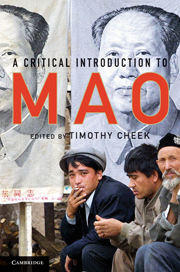Book contents
- Frontmatter
- Contents
- List of Illustrations
- About the Contributors
- Preface
- Acknowledgments
- Timeline of Twentieth-Century China
- Maps
- Part I Mao's World
- Part II Mao's Legacy
- 10 For Truly Great Men, Look to This Age Alone: Was Mao Zedong a New Emperor?
- 11 Recent Mao Zedong Scholarship in China
- 12 Third World Maoism
- 13 Mao's Journeys to the West: Meanings Made of Mao
- 14 Two Perspectives on Mao Zedong
- Appendix: Selected Further Readings (Annotated)
- Index
- References
12 - Third World Maoism
Published online by Cambridge University Press: 05 August 2012
- Frontmatter
- Contents
- List of Illustrations
- About the Contributors
- Preface
- Acknowledgments
- Timeline of Twentieth-Century China
- Maps
- Part I Mao's World
- Part II Mao's Legacy
- 10 For Truly Great Men, Look to This Age Alone: Was Mao Zedong a New Emperor?
- 11 Recent Mao Zedong Scholarship in China
- 12 Third World Maoism
- 13 Mao's Journeys to the West: Meanings Made of Mao
- 14 Two Perspectives on Mao Zedong
- Appendix: Selected Further Readings (Annotated)
- Index
- References
Summary
The idea of the third world developed in the wake of World War II to describe the nations of Asia, Africa, and Latin America. While the first world of capitalism led by the United States and the second world of socialism led by the Soviet Union fought for global domination in the cold war, the third world often was the battleground and theater of operations. This supposedly underdeveloped third world served simultaneously as the cannon fodder, barometer, and spoils of a war over the fate of global modernity – as that two-thirds of the world with “its futures mortgaged to either capitalism or socialism.” Obviously, this cold war model discounts the third world, seeing it as the passive object of a contested but nevertheless teleological history. The people of the third world did not necessarily share this view, instead seeing the postwar period as a global moment of anticolonial, anti-imperialist movements. Revolutionaries seized on their designation as third world subjects to push for solidarity in what they perceived as a shared struggle for national liberation. For many, Maoism provided the ideological underpinnings and a practical blueprint for the struggle.
THIRD WORLD TO THREE WORLDS
Maoism and the Emergence of the Third World
Mao's China took an interest in third world politics from the beginning, dispatching senior statesman Zhou Enlai to attend its seminal organizing moment, the 29-nation Afro-Asian Conference held in Bandung, Indonesia, in April 1955.
- Type
- Chapter
- Information
- A Critical Introduction to Mao , pp. 288 - 312Publisher: Cambridge University PressPrint publication year: 2010
References
- 10
- Cited by



